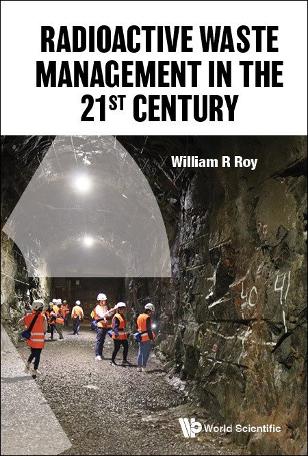New book shows how geological and engineering barriers can safely isolate radioactive wastes
Nuclear energy is a mature and dependable technology. Many people do not realize that their electricity comes from harnessing the energy of uranium. Anti-nuclear activists claim that the world should abandon nuclear energy because we do not know how to safely manage radioactive wastes. This claim is not valid.
This new textbook provides the most current information available on waste management in several countries. Radioactive Waste Management in the 21st Century cites numerous case studies to illustrate past practices and current methodologies, to provide insights on how radioactive wastes may be managed in the future. An international perspective on waste management is provided to help the readers better understand the diversity in approaches while highlighting what many countries have in common.
Written to emphasize how geology and radionuclide chemistry impact waste management, this textbook is primarily designed for students who have little background in geology and the environmental chemistry of radionuclides associated with low-level wastes, decommissioning wastes, DOE legacy wastes, high-level wastes and spent nuclear fuel.
The intended audiences for this textbook are undergraduate and graduate students in science and engineering, college-level faculty, attendees at waste-management training courses, Federal and commercial waste management/site remediation staff, environmental consultants, and waste management personnel in the military. At the end of each chapter are review questions that are intended to make this textbook ready for immediate classroom use.
Radioactive Waste Management in the 21st Century retails for and US$98 / £85 (hardcover) and is also available in electronic formats. To order or know more about the book, visit http://www.
###
About the Author
William R. Roy is a Professor andLecturer in the Department of Nuclear, Plasma, and Radiological Engineering at the University of Illinois at Urbana-Champaign. He is a former Senior Geochemist at the Illinois State Geological Survey. His academic background includes a BS and MA in Geology at Indiana University, and a PhD in Soil Physical Chemistry at the University of Illinois. He has led numerous research projects concerning the management of hazardous, radioactive, urban, agricultural, and coal utilization wastes, and their impacts on groundwater and soil quality. He has authored or co-authored 109 journal papers, technical reports, and symposia contributions. He has also authored 16 book chapters on environmental chemistry and co-authored a course companion on managing radioactive wastes for the Swedish Royal Institute of Technology in Stockholm where he taught a summer course. He currently teaches courses on managing radioactive wastes and decommissioning nuclear facilities at the University of Illinois, and one course on environmental restoration and waste management for the University of Denver.
About World Scientific Publishing Co.
World Scientific Publishing is a leading international independent publisher of books and journals for the scholarly, research and professional communities. World Scientific collaborates with prestigious organisations like the Nobel Foundation and US National Academies Press to bring high quality academic and professional content to researchers and academics worldwide. The company publishes about 600 books and over 140 journals in various fields annually. To find out more about World Scientific, please visit http://www.
For more information, contact Amanda at [email protected].
Media Contact
Amanda Yun
[email protected]
Original Source
https:/





